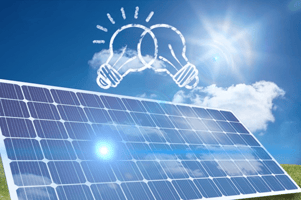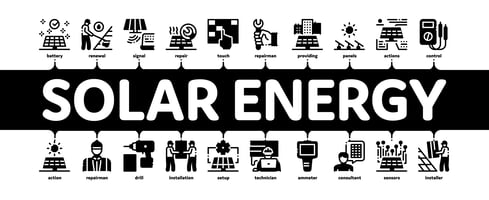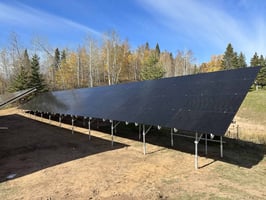Many homeowners and businesses across the state are looking for ways to reduce their carbon footprint, save valuable energy costs, and take advantage of tax credits offered by the state. But, with so much information on solar panels, it can be hard to know where to start. Besides, solar panel technology is rapidly picking up with new advancements every day. That means figuring out how much they cost can be tricky.
In this blog post, Wolf River Electric is here today to de-mystify things for you. We’ll break down how much solar panels typically cost in Minnesota as well as other key considerations throughout your buying process. Let’s dive into what makes up the costs associated with installing a reliable solar system.
Average Solar Panel Cost in Minnesota
The average solar panel cost in Minnesota is $3.43/W. For a solar panel system size of 5 kW, the installation costs range between $15,000 and $20,000, with the average gross price being $17,500.
While these costs may seem steep, Minnesota’s abundant sunlight and the state’s generous net metering and incentive programs make solar energy a worthwhile investment for homeowners and businesses alike.
Also, with the rapidly falling costs of solar technology and government efforts towards cleaner energy, Minnesota is poised to become among the leading states in renewable energy adoption.
Why You Need To Install Solar Panels
The reasons for solar panel installation are numerous and incredible. Here are the top reasons why you should consider investing in solar energy:
Lower Energy Costs
Solar energy is a free, renewable resource that can help lower electricity costs. Installing solar systems in Minnesota will allow you to generate most of your energy, reducing or eliminating the need to purchase electricity from your utility company. This saves money on your monthly power bills and potentially makes money by selling excess energy back to the grid.
Establish Energy Independence
Solar panel systems in Minnesota also give you greater control over your energy supply and usage, allowing you to manage the power you consume and produce better. This can reduce your reliance on traditional sources of electricity, such as coal or nuclear power plants, giving you the freedom to choose your energy sources.
Environmental Benefits
Solar panels are a clean and renewable energy source that does not produce emissions or pollutants like traditional power plants. Installing solar in Minnesota will help reduce your carbon footprint and contribute to a cleaner environment overall.
Federal Incentives
Another great reason to install solar energy systems in Minnesota is the availability of federal incentives. The Federal Solar Investment Tax Credit allows homeowners to receive a 30% tax credit on their solar system installation costs, giving them more incentive to invest in renewable energy.
Reduce Maintenance Costs
As opposed to traditional fossil fuel sources, solar power can help reduce overall maintenance costs as the panels are self-contained and require minimal upkeep. This can help save you money in the long run, as you won’t have to worry about costly repairs or replacement parts.
Increase Home Value
Installing solar panels in Minnesota can increase your home’s value as potential buyers may be attracted to a property that has already invested in renewable energy. This could lead to a higher sale price or a shorter waiting time when you decide to put your home on the market.
Go Solar Today!
Factors That Determine The Cost Of Solar Panels In Minnesota
Different factors have an impact on the cost of solar panels in Minnesota. These include:
System Size
The larger the system size, the more it will cost to install and maintain. This is because a large system requires more solar panels, mounts, and electrical components. It also takes longer to install. On average, installing a 5kW system can cost around $17,000, while installing a 10kW solar panel system can cost around $33,000.
Panel Brand And Quality
Different brands of solar panels have different efficiency ratings. Higher quality and more efficient panels usually cost more than lower quality or less efficient models. The brand will also influence the warranty offered with the system and any potential labor costs associated with installation and maintenance.
Panel Type
Monocrystalline panels are usually more expensive than polycrystalline or thin film models, but they’re more efficient and offer better performance in hot climates. For example, a 5kW monocrystalline system can cost around $18,000, while a 10kW system can cost around $35,000.
Roof
A ground-mounted system may require more labor due to excavation and foundation work, thus raising the total installation costs. If you need to replace or repair your roof to install solar panels, this will also increase the overall cost.
Company Installing Solar Panels
Different solar companies offer different rates for their services and materials. Therefore, researching various options online can help you find the best deal for your needs. You may be lucky to find a solar installation company that offers discounts or incentives to reduce the total cost of a system.
Permits
Local municipalities require permits for the installation of solar panels. These permits can be expensive, and some cities may require additional licensing or inspections before installation. This will add to the cost of your system, so be sure to factor in these costs when budgeting for a new system.
Warranties
Solar panel manufacturers offer different warranties for their products. Higher-quality solar panels usually come with longer warranties, which can increase the overall cost of the system. Other solar installers may offer additional labor or materials warranty coverage, adding to the total cost.
Incentives And Tax Credit
Different states and local municipalities offer incentives and tax credits for solar energy systems. These incentives help offset the cost of your system, so research the available programs in your area. What’s more, some utility companies may offer rebate programs that can further reduce the overall cost of a solar panel system in Minnesota.
Minnesota Solar Incentives & Tax Credits
The State of Minnesota offers several financial incentives and tax credits for installing a residential solar energy system, including:
Federal Solar Tax Credit
The Federal Solar Tax Credit, or the Investment Tax Credit (ITC), is a federal incentive program allowing US taxpayers to claim a tax credit for solar energy systems. This tax credit covers up to 30% of the solar energy system’s cost and can be used for residential and commercial projects.
The ITC was available for systems placed in service through December 31, 2021, then dropped to 26% for systems placed in service in 2022 and 2023.
Net Metering
Net metering is a system that allows solar energy customers to receive credits on their utility bills for any excess energy produced by their solar panel array that feeds into the electrical grid. The credits can offset any energy consumed from the grid, resulting in a net-zero energy balance and potentially reducing or eliminating the customer’s electric bill.
Solar Property Tax Exemptions
In Minnesota, solar energy systems are exempt from property taxes for up to 20 years after installation. This exemption is available for residential and commercial solar systems, making it easier to afford the upfront costs of installing a solar energy system.
Sales Tax Exemption
In addition to providing property tax exemptions for solar energy systems, Minnesota also exempts the sale of any solar energy system components from sales taxes. This exemption applies to residential and commercial solar panel installations and can save customers up to 10% of their total costs.
Solar Financing In Minnesota
Cash Purchase
Cash purchasing a solar energy system is the simplest and most direct form of financing, as you own the system outright. The initial investment can be high, but often times there are incentives, such as tax credits or rebates, that can help offset some of the costs. Additionally, with no interest to pay over time, the cost of ownership is dramatically reduced.
Solar Loan
A solar loan works similarly to any other type of loan – you borrow money and pay it back over a set period with interest. When choosing a lender, compare interest rates and repayment terms to find the best deal for your needs. Solar loans are great for those who cannot put the full payment up front and want to spread their payments over time.
Solar Lease
A solar lease is an agreement with a third party in which you agree to pay a fixed rate for the solar energy generated from your system. This rate is typically lower than what you would pay for electricity from your utility provider, and you don’t have to make an upfront payment. However, at the end of the lease term, you may not own the system and may be responsible for any necessary repairs or upgrades.
Wrap-Up: Go Green In Minnesota With Wolf River Electric

It is clear that if you live in Minnesota, going green is a great option. Wolf River Electric helps you switch to green energy solutions throughout your journey. Going green not only protects the environment, but it can also save you money in the long run.
We offer many communication services at Wolf River, and you deserve to be informed about them before deciding what path to take. Ultimately, furthering our understanding of sustainable living practices is crucial for all of us in Minnesota.
At Wolf River Electric, we provide you with resources to increase your sustainability initiatives. There are simple steps we can take today, such as becoming more energy-efficient and reducing waste; these small changes can have a profound positive influence on our collective future.
With this said, if you’re interested in getting started with solar power in Minnesota, contact us at Wolf River Electric today.
Join Our Solar Community
Get exclusive access to the latest solar news, tips, and promotions!


